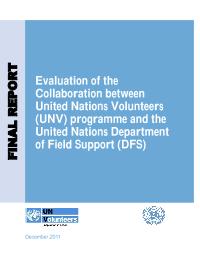
Evaluation of the Collaboration between United Nations Volunteers (UNV) programme and the United Nations Department of Field Support (DFS)
Electoral laws, processes and institutions strengthen inclusive participation and professional electoral administration
National, regional and local levels of governance expand their capacities to reduce conflict and manage the equitable delivery of public services
Legislatures, regional elected bodies, and local assemblies have strengthened institutional capacity, enabling them to represent their constituents more effectively
Effective, responsive, accessible and fair justice systems promote the rule of law, including both formal and informal processes, with due consideration on the rights of the poor, women and vulnerable groups
Strengthened capacities of national human rights institutions
National and local institutions have the capacities to prevent, reduce and mitigate the impact of conflict
National and local institutions have the capacities to fulfill key functions of government for recovery in early post-crisis situations
National and local institutions have the capacity to respond to gender-based violence and to increase women's civic engagement, participation and leadership in crisis prevention, ongoing crisis and post-crisis contexts
National and local institutions have the capacity to deliver improved justice and security, including safeguarding citizen security, in conflict-affected settings
Livelihoods and economic recovery generated, including infrastructure restoration, employment and sustainable income earning opportunities for crisis affected communities
1: Crisis Prevention & Recovery
2: Democratic Governance


